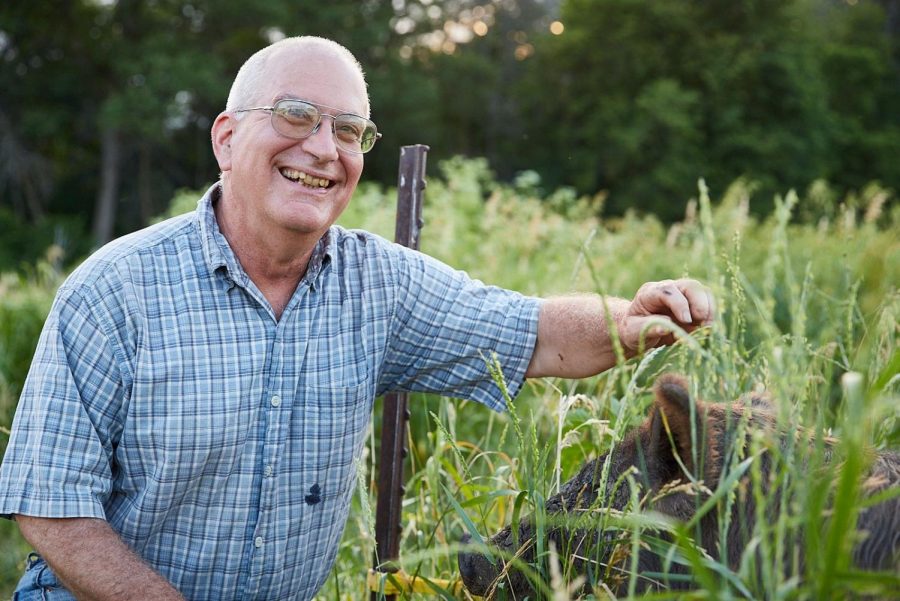Spence farm grows to supplying individual families
Photo Courtesy of Village Farmstand Website
Farmer Marty Travis sits in a field with one of his pigs. Travis, along with his son Will, co-own Spence Farm and have recently pivoted to selling their produce to families.
February 8, 2021
When driving back to campus, speeding past the cornfields that signal school is nearby, one might see a patch of maple trees, jutting from the sea of green stalks. In front of these maple trees lies Spence Farm and the ninth generation of farmers to cultivate its land.
Spence Farm is featured in the documentary “Sustainable” for their efforts to grow sustainably and share their knowledge with others. The film looks at the instability of America’s food system both economically and environmentally. It explores the issues faced by those who work in agriculture as well as the people emerging as leaders working to fix it.
When COVID-19 first hit Illinois, the restaurants Spence Farm delivered to began to close. This posed a challenge for co-owner Will Travis.
“We were delivering to about 45 restaurants,” Travis said. “That week that everything shut down we went to having about three restaurants.”
Years before the pandemic, Travis said his father and co-owner of Spence Farm, Marty Travis, wondered what they would do if restaurants began to close.
Get The Daily Illini in your inbox!
“We thought it would never happen but ‘what if?’” Travis said. “We would pivot to doing groceries for families.”
That’s just what they did and their sales grew to be double what they were before COVID-19, Travis said.
Individuals order on the Village Farmstand website and Spence Farm packages the orders in bulk to send to the customer pick-up location in Evanston.
As restaurants are starting to re-open, Travis said he estimates the farm is supplying 30 percent of the original restaurants. However, Travis said the bulk of their business is individual orders.
Spence Farm has also started another initiative in an effort to keep restaurants in business. Travis said they’re supplying prepared frozen meals or shelf staples for restaurants to sell.
“We’re able to keep the restaurants selling products but not having to have people in the seeds doing that stuff as well,” Travis said.
Spence Farm currently supplies one restaurant in Champaign County, The Wheelhouse. This restaurant located in St. Joseph focuses on serving great food with locally sourced ingredients. When crafting their vision for the restaurant, chef and owner, Ryan Rogiers knew he wanted Spence Farm to be their supplier.
“When my wife and I decided to open a restaurant, we knew we wanted a farm-to-table and to work with local farms,” Rogiers said. “We actually watched the documentary and contacted him and the rest is history.”
When COVID-19 impacted The Wheelhouse, Rogiers said he spoke with Marty about selling groceries at the restaurant.
“When COVID-19 started last March, Marty and I talked right away because he was worried about keeping revenue,” Rogiers said. “I started having groceries available at The Wheelhouse.”
Rogiers decided to add something special for patrons who order Spence Farm’s produce and pick it up at The Wheelhouse. When customers come and pick-up their boxes, Rogiers said he made videos to show customers how to prepare the food at home.
“It’s been pretty popular,” Rogiers said. “We probably do about 10-15 grocery boxes a week now which drives revenue for the restaurant and helps the farmers.”
Coming down the road, Travis said Spence Farm is trying to start a home delivery service for the Champaign area.
Travis said they also have preliminary projects lined up with the University to provide food and sustainable agriculture education.
In the meantime, Travis said he wants students to know that buying locally is a great option.
“There’s good food that’s grown locally,” Travis said. “You can support at the restaurants. So search it out and it’s not always as expensive as what people think it is.”
Travis also encourages students seeking a career in agriculture to look beyond traditional methods of farming.
“Learn all sides of it,” Travis said. “There’s so many different ways of agriculture. I feel like many people kind of close off and stay in their lane and it always helps to see the other side of it as well.”







